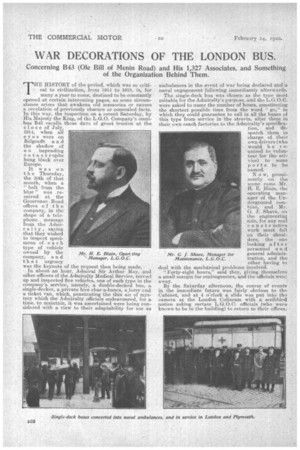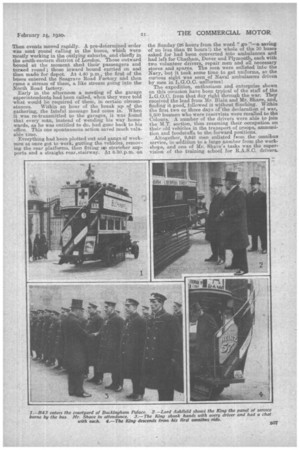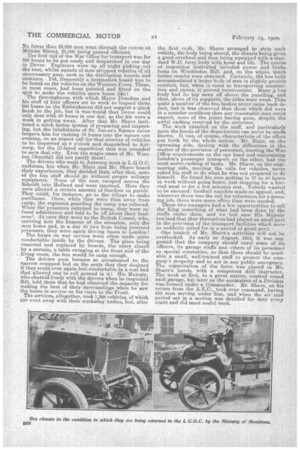WAR DECORATIONS OF THE LONDON BUS.
Page 20

Page 21

Page 22

If you've noticed an error in this article please click here to report it so we can fix it.
Concerning B43 (Ole Bill of Menin Road) and His 1,327 Associates, and Something of the Organization Behind Them.
THE . HE HISTORY of the period, which was so critical to civilization, from 1914 to 1918, is, for many a year to come, destined to be constantly opened at certain interesting pages, as some circumstance arises that awakens old memories or causes a revelation of previouSly obscure or .coneealed facts. In this way, the inspection on a, recent Saturday, by His Majesty the King, of the L.G.O. Company's omnibus B43 recalls those days of great tension at the close of July, 1914, when all eyes were on Belgrade and the shadow of a n impending catastrophe hung black over Europe.
It was an t h e Thursday, the 30th of that month, when a " bolt from the blue" was received at the Grosvenor Road offices of the company, in the shape of a telephone message from the Admiralty, saying that they wished to inspect specimens of each type of vehicle owned by the company, a n d that urgency was the keynote of the request then being made.
In about an hour, Admiral Sir Arthur May, and other officers of the Admiralty Medical Service, turned up and inspected five vehicles, one of each typo in the company's service, namely, a double-decked bus, a single-decker, a private hire char-a,-banes, a lorry and a ticket van, which, penetrating the thin air of mystery which the Admiralty officials endeavoured, for a time, -to maintain, it was ascertained were being considered with a view to their adaptability for use as Mr. H. E. Blain, Open ting Manager, L.G.O.C. ambulances in the evOit of war being declared and naval engagement following immediately afterwar-ds.
The single-deck bus was chosen as the type Most suitable for the Admiralty's purpose, and the L.G.O.C. were asked to name the number of hours, constituting the Shortest possible time from the word " go," in which they could guarantee to call in all the buses of this type from service in the streets, alter them. in their own coach factories to the Admiralty's specification, and 'despatch them in charge of their own drivers (who would be required to volunteer for the service) to some ports to be named.
'1\1o w, promi-. nently on the scenecame Mr. H. E. Blain, the operating manager of the Underground combine, and Mr.
0. J. Shave, on•the engineering
side, for any real con str uctiVe work must fill on their shoulders, the one looking after personnel a n d general administration, and the other having to deal with the mechanical problems involved.
"Forty-eight hours ': said they, giving themselves a small margin for contingencies, and tie officials wentaway.
By the Saturday afternoon, the course of events in the immediate future was fairly obvious to the Cabinet, -and at 4 o'clock a slide was put into the camera at the London Coliseum with a scribbled notice asking certain L.0.0.0. officials (who were known to-be in the building) to return to their offices.;
Mr. G. J. Shave, Manager for Maintenance, L.G.O.C.
Then events moved rapidly. A pre-determined order was sent round calling in the buses, which were mostly working in the outlying suburbs, and chiefly in the south-eastern district of London. Those outward bound at the moment shed their passengers and -Lurked round; those inward bound carried on and then made for depot. At 4.40 p.m., the first of the buses entered the Seagrove Road Factory and then came a stream of them, a like stream going into the North Road factory. Early in the afternoon a meeting of the garage superintendents had been called, when they were told what would be required of them, in certain circumstances. Within an hour of the break up of the gathering, the fateful message had come in. When it was re-transmitted to the garages, it was found that every man, instead of wending is way homewards, as he was entitled to do, had gone back to his office. This one spontaneous action saved much valuable time.
Everything had been plotted out andga.ngs of workmen at once got to .work, gutting the vehicles, removing the rear platforms, then fitting on stretcher supports and a straight rear.stairway. At 6.30, p.m.. on
the Sunday (26 hours from the word "go "—a saving, of no less than 22 hours!) the whole of the 30 buses asked for had been converted into ambulances and had left for Chatham, Dover and Plymouth, each with two volunteer drivers, repair men and all necessary stores and spares. The men were enlisted into the Navy, but it took some time to get uniforms, so the curious sight was seen of Naval ambulances driven by men in L.G.O.C. untframs! The expedition, enthusiasm and enterprise shown on this occasion have been typical of the staff of the L.G.O.C. from that day right through the war. They received the lead from Mr. Blain and Mr. Shave, and, finding it good, followed it without flinching. Within the first two or three days of-the declaration of war, 3,500 busmen who were reservists were recalled to the Colours. A number of the drivers were able to join the M.T. section, thus resuming their occupation on their old vehicles in the transport of troops, ammunition and foodstuffs to the forward positions.
Altogether, 9,648 men enlisted Nom the omnibus service, in addition to a large number from the workshops, -and one of Mr. Shave's tasks was the supervision of the training school. for R.A.S.C. drivers.
No fewer than 23,000 men went through the course at Milman Street, 21,000 being passed efficient. The first call of the War Office for transport was for 3.00 buses to be got ready and despatched in one day to Dover. Engineers were up all night picking out the best, whilst squads of men stripped vehicles of all unnecessary gear, such as the destination boards and Cushions. Yet, frequently a destination board was to be found on the vehicles on the Western Front. These,' in most cases' had been painted and fitted on the spot to make the vehicles more home likel The thoroughness with which Major Donohue and his staff of four officers set to work to inspect thoSe 300 buses On the Embankment did not suggest a quick finish to the job, but it was,found that Dover could only deal with 50 buses in one day, so the 300 were a week in getting away. After that Mr. Shave instituted a much better system of preparing and inspecting, but the inhabitants of -St. James's Square never forgave him for rushing 75 buses into the square one evening, on an urgent call for that number ofvehicles to be inspected at 8 o'clock and despatched to Antwerp, for the ill-fated expedition that was intended to save that city. Eten the magic name of Mr. Winston Churchill did net pacify them! . The drivers who went to Antwerp went in L.G.O.C. uniforms, but when Mr. Blain and Mr. Shave heard their experiences, they decided that, after that, none of the bus staff should go without proper military equipment.Z.4.,mae of the men escaped across the Scheldt into Holland and were interned. Here they were allowed a certain amount of freedom on parole. They could, for instance, go to the village to make purchases. Once, while they were thus away from camp, the regiment guarding the camp was relieved. When the prisoners returned to camp, they were re-fused admittance and told to he off about their business! At once they went to the British Consul, who, entering into the humour of the situation, sent the men home and, in a day or two from being interned prisoners, they were again driving buses in London !
The buses on war service were often made quite comfortable inside by the drivers. The glass being removed and replaced by boards, the entry closed by a curtain, a table swinging at the front end of the living room, the bus would be snug enough. The drivers seen became so accustomed to the narrow cramped bed on the seats that they doubted if they could ever again feel comfortable in a real bed that allowed one to roll around in it! His Majesty, who chatted freely with the drivers when he inspected B43, told them that he ha4 observed the capacity for making the best of their surroundings when he saw the buses in service on his visits to the Front. The services, altogether, took 1,328 vehicles, of which 450 went away with their workaday bodies, but, after the first rush, Mr. Shave arranged to strip each vehicle, the body being stored, the chassis being given a good overhaul and then being equipped with a stan dard W.D. lorry body with hood and tilt. The course of inspection instituted included power and brake tests on Wimbledon Hill, and on the whole, .much better results were obtained. Certainly, the bus body accommodated a larger body of men in slightly greater comfort, but, when it came to transporting ammuni tion and stores, it proved inconvenient. Many ,A bus body had its top sawn off above the panelling, and then, shorn of its supports, the sides were weak. Thus
quite a-number of the bus bodies never came back intact, but it was observed that those which did were in a. sounder condition than any reasonable man could expect, none of the joints having gone, despite the awful racking received by the structure.
The work entailed on the staff, and particularly upon the heads of the departments can never be made knownIt was, of course, characteristic of the effort put forth by the whole nation. Mr. Blain, on the operating side, dealing with the difficulties in the matter of the provision of personnel, meeting the War.
Office requirements on the cue hand and maintaining London's passenger transport on the other, had the most nerve-racking of-tasks. Mr. Shave, on the engi
neering side, meeting the calls for vehicles, never asked his staff to do what he was not prepared to do himself. He found his men putting in 47 to 50 hours at work without going home, just stopping for a hurried meal or for a few minutes rest. Nobody wanted to be excused: football matches made no appeal, and, whenever there was the call for volunteers for a pressing job, there were more offers than were needed. These two managers had a few opportunities to tell the King something of what had been done by the staffs ender them, and we feel sure His Majesty realized that they themselves had played no small part in the provision of the transport facilities which were so suddenly called for in a period of great peril.
One branch of Mr. Shave's activities will not toe ovetlooked. As early as August, 1914, it was sug
gested that the company should enrol some of its officers, its garage staffs and others of its personnel as special constables, so that there should be avail able a small, well-trained staff to protect the com pany's proeerty and to act in any public emergency. The organization of the force was placed in Mr. Shave's hands, with a competent drill instructor. The work at first, to a great extent, centred round each garage, but later on the equivalent of a-Division'
was formed under a Commander. Mr. Shave, on his return from the A.E.C...took over command, having 485 men serving under him, and when the air raid period set in a section was detailed for duty every night and did most useful work.




























